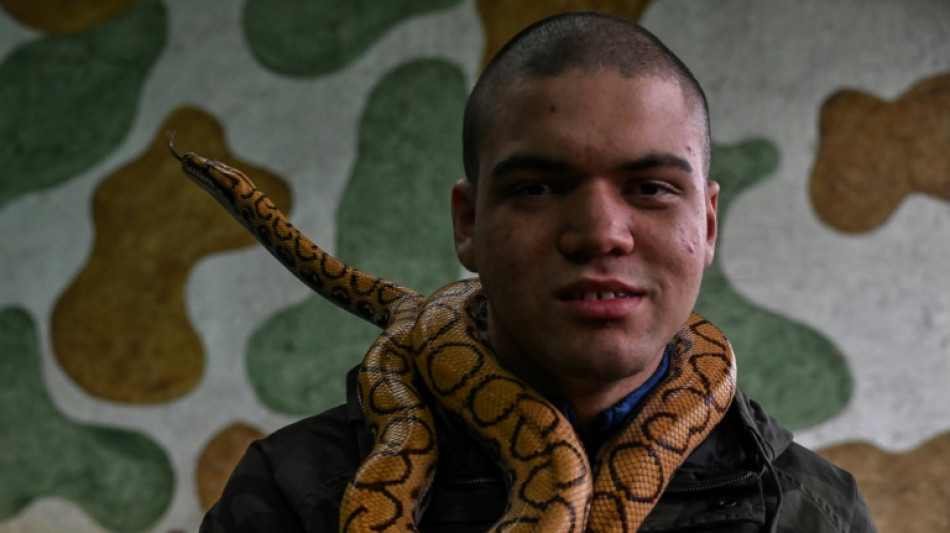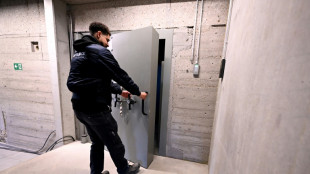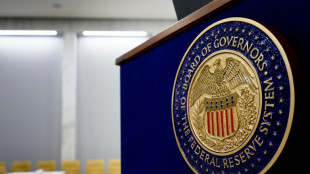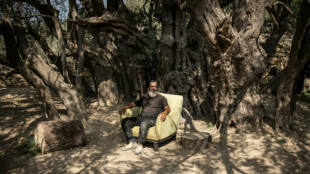
-
 Scandic Trust Group strengthens sales network with First Idea Consultant
Scandic Trust Group strengthens sales network with First Idea Consultant
-
Frank says Spurs supporting Udogie through 'terrible situation'

-
 MSF warns of missing civilians in Sudan's El-Fasher
MSF warns of missing civilians in Sudan's El-Fasher
-
Norris on top as McLaren dominate opening Sao Paulo practice

-
 UN warns 'intensified hostilities' ahead in Sudan despite RSF backing truce plan
UN warns 'intensified hostilities' ahead in Sudan despite RSF backing truce plan
-
Seven hospitalized after suspicious package opened at US base

-
 Guardiola says 'numbers are insane' as he reaches 1,000 games in charge
Guardiola says 'numbers are insane' as he reaches 1,000 games in charge
-
Brazil welcomes China lift of ban on poultry imports

-
 Scotland captain Tuipulotu bids for landmark win over All Blacks
Scotland captain Tuipulotu bids for landmark win over All Blacks
-
Woman convicted in UK of harassing Maddie McCann's parents

-
 Tanzania charges more than 100 with treason over election protests
Tanzania charges more than 100 with treason over election protests
-
Nexperia chip exports resuming: German auto supplier

-
 Genge warns England to beware 'nasty' Fiji at Twickenham
Genge warns England to beware 'nasty' Fiji at Twickenham
-
Stocks fall on renewed AI bubble fears

-
 UK grandmother on Indonesia death row arrives back in London
UK grandmother on Indonesia death row arrives back in London
-
Spanish star Rosalia reaches for divine in new album

-
 Portugal's Mendes out injured as Neves returns for World Cup qualifiers
Portugal's Mendes out injured as Neves returns for World Cup qualifiers
-
Afghan-Pakistan peace talks push ahead after border clashes

-
 Fleetwood in tie for lead at halfway stage in Abu Dhabi
Fleetwood in tie for lead at halfway stage in Abu Dhabi
-
Brazil court starts hearing Bolsonaro appeal

-
 Serbia fast-tracks army HQ demolition for Trump family hotel
Serbia fast-tracks army HQ demolition for Trump family hotel
-
Ireland captain Doris 'mentally stronger' after long break

-
 MSF accuses powerful nations of weakening S.Africa's G20 health text
MSF accuses powerful nations of weakening S.Africa's G20 health text
-
Maresca defends Chelsea rotation policy after Rooney criticism

-
 Hundreds of flights cut across US in government paralysis
Hundreds of flights cut across US in government paralysis
-
Xhaka 'made me a better coach', says Arsenal boss Arteta

-
 Central Nigerian town rebuilds religious trust in shadow of Trump's threat
Central Nigerian town rebuilds religious trust in shadow of Trump's threat
-
Inside Germany's rare earth treasure chest

-
 Former jihadist Syrian leader makes unprecedented White House visit
Former jihadist Syrian leader makes unprecedented White House visit
-
Kagiyama takes NHK lead in Japan to kick-start Olympic season

-
 Ikea profits drop on lower prices, tariff costs
Ikea profits drop on lower prices, tariff costs
-
European, Asian stocks decline after Wall Street slide

-
 Tuchel brings 'immense' Bellingham and Foden back into England fold
Tuchel brings 'immense' Bellingham and Foden back into England fold
-
German FA extends with president Neuendorf until 2029

-
 No end to Sudan fighting despite RSF paramilitaries backing truce plan
No end to Sudan fighting despite RSF paramilitaries backing truce plan
-
US officials, NGOs cry foul as Washington snubs UN rights review

-
 Injured teen medal hope Tabanelli risks missing home Winter Olympics
Injured teen medal hope Tabanelli risks missing home Winter Olympics
-
Bellingham, Foden recalled to England squad for World Cup qualifiers

-
 Tanzania rights group condemns 'reprisal killings' of civilians
Tanzania rights group condemns 'reprisal killings' of civilians
-
Slot urges patience as Isak returns to training with Liverpool

-
 Rees-Zammit set for Wales return with bench role against Argentina
Rees-Zammit set for Wales return with bench role against Argentina
-
China's new aircraft carrier enters service in key move to modernise fleet

-
 Operation Cloudburst: Dutch train for 'water bomb' floods
Operation Cloudburst: Dutch train for 'water bomb' floods
-
Leaders turn up the heat on fossil fuels at Amazon climate summit

-
 US travel woes mount as govt shutdown prompts flight cuts
US travel woes mount as govt shutdown prompts flight cuts
-
North Korea fires unidentified ballistic missile: Seoul military

-
 West Bank's ancient olive tree a 'symbol of Palestinian endurance'
West Bank's ancient olive tree a 'symbol of Palestinian endurance'
-
Global tech tensions overshadow Web Summit's AI and robots

-
 Green shines as Suns thump Clippers 115-102
Green shines as Suns thump Clippers 115-102
-
Japan to screen #MeToo film months after Oscar nomination

| RYCEF | -1.21% | 14.82 | $ | |
| CMSC | -0.17% | 23.74 | $ | |
| RBGPF | 0% | 76 | $ | |
| VOD | 1.95% | 11.566 | $ | |
| NGG | 0.95% | 77.02 | $ | |
| SCS | 0.13% | 15.78 | $ | |
| GSK | -0.82% | 46.715 | $ | |
| RIO | -0.95% | 68.62 | $ | |
| BTI | 0.36% | 54.405 | $ | |
| AZN | 0.99% | 84.605 | $ | |
| CMSD | -0.37% | 23.922 | $ | |
| RELX | -2.55% | 42.31 | $ | |
| BCE | -0.13% | 23.14 | $ | |
| BCC | 0.31% | 70.95 | $ | |
| BP | 0.93% | 36.155 | $ | |
| JRI | -0.62% | 13.665 | $ |

Snakes as therapy animals: reptiles help heal in Brazil
A yellow-and-brown boa constrictor wraps itself around David de Oliveira Gomes's neck like a scarf, but the 15-year-old Brazilian with autism is fascinated, not afraid.
For him, this is therapy.
"His name is Gold. He's cold. He eats mice," Gomes tells his therapist at a treatment center in Sao Paulo, gently holding the large snake as it slithers around him.
That is exactly the kind of sentence his therapist, Andrea Ribeiro, is trying to elicit.
She specializes in treating people with disabilities, autism or anxiety, using an unusual method: reptile therapy, which she says helps patients relax and improve their communication, motor skills and other abilities.
"He's working on speech and memory formation," the 51-year-old language-speech therapist says of Gomes, sitting at a table with him and the large snake.
Ribeiro has pioneered this method over the past decade at the treatment center, which features an open-air space where patients interact with lizards, turtles and a "jacare" -- a kind of alligator native to Latin America that is common in Brazil, including in the Amazon rainforest.
The treatment is not scientifically proven.
But "it's been medically demonstrated that when people come in contact with animals, it releases neurotransmitters such as serotonin and beta-endorphins that give a sense of pleasure and well-being," says Ribeiro.
"That makes (patients) feel good and want to learn."
The reptiles "enable us to achieve better, faster results," she told AFP.
- Step aside, dogs -
Ribeiro used to use dogs in her treatment sessions.
But she found their constant attempts to play and interact made some patients uneasy, especially those with autism.
So she turned to reptiles.
It's a class of animals that makes many people squirm.
But people with autism tend to approach them "without prejudice," she says: The animals spark their curiosity without making them uncomfortable.
The reptiles, for their part, "are indifferent," she says.
"They don't seek attention the way some mammals do."
Ten-year-old Gabriel Pinheiro is petting a small alligator, trying to imitate Ribeiro's syllables by opening his mouth wide three times: "Ja-ca-re."
"It's wet," he says, his eyes fixated on the creature from behind his glasses.
The alligator's scales are "hard," its belly "soft," he says, as the therapist helps him work on opposites.
He and Ribeiro then sing a song about the jacare to practice auditory memory skills.
Pinheiro's mother, Cristina, credits four years of this therapy with helping improve his listening, communication and motor skills.
"He's always happy when we come," she says.
- Reptilian massage -
Another patient, 34-year-old Paulo Palacio Santos, suffered severe brain damage in an accident that left him paralyzed and speechless.
Ribeiro wraps his face with a thick snake, whose weight and cold temperature help reactivate Santos's swallowing reflex, she says.
She then uses a smaller boa constrictor to work the muscles around his mouth.
The handling of these species is regulated by Brazil's environmental authority, IBAMA.
Ribeiro works side-by-side with biologist Beatriz Araujo, whose job is to monitor the animals' stress levels and ensure patients remain safe.
There has never been an accident in 10 years of treatment, the center says.
The reptiles, which are raised on site, are accustomed to human contact. No poisonous snakes are used.
"I'm always here, just in case (an animal) reacts unexpectedly," says Araujo.
"The dangers are the same as for close contact with any animal."
S.Barghouti--SF-PST




